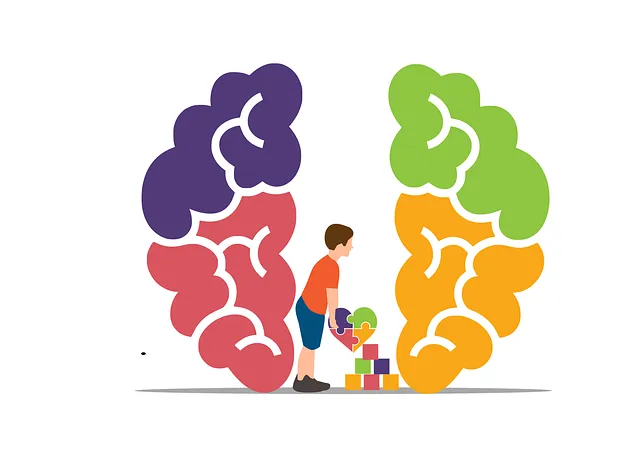Mental wellness group facilitation at Kaiser Permanente Lone Tree is a vital part of their healthcare services, creating supportive communities for emotional healing and preventing burnout among community members. Facilitators balance structured agendas with adaptability, employing techniques like active listening, anonymous sharing, and role-playing to foster open dialogue and reduce stigma. Success is measured through surveys, qualitative data, and journaling exercises, tracking stress management improvements and personal growth while aligning with the facility's commitment to comprehensive mental wellness in Kaiser Permanente mental health jobs Lone Tree.
Mental wellness group facilitation plays a pivotal role in supporting individuals navigating emotional challenges. This article explores effective techniques tailored for Kaiser Permanente Lone Tree, focusing on their unique contribution to mental health care. We delve into essential skills required for facilitators, strategies to create safe spaces, and evaluation methods to measure success. By examining these practices, we highlight how Kaiser Permanente Lone Tree fosters inclusive mental wellness support, enhancing the lives of those seeking guidance in a supportive environment. Discover their innovative approach to mental health jobs within the organization.
- Understanding Mental Wellness Group Facilitation: A Role for Kaiser Permanente Lone Tree
- Essential Skills for Effective Group Facilitation in Mental Health Settings
- Strategies for Building a Safe and Supportive Group Environment
- Measuring Success: Evaluation Techniques for Mental Wellness Group Programs at Kaiser Permanente Lone Tree
Understanding Mental Wellness Group Facilitation: A Role for Kaiser Permanente Lone Tree

Mental wellness group facilitation plays a pivotal role in fostering community and emotional healing processes within communities, especially in areas like Kaiser Permanente Lone Tree, where access to mental health services is crucial. As an integral part of healthcare delivery, such groups offer a safe space for individuals to connect, share experiences, and learn from one another, enhancing their overall well-being.
Kaiser Permanente Lone Tree, known for its commitment to comprehensive healthcare, recognizes the power of group facilitation in addressing not just individual needs but also public awareness campaigns related to mental health. By facilitating these groups, professionals contribute to burnout prevention among community members while promoting holistic well-being. This approach ensures that emotional healing processes become more accessible and effective, catering to a diverse range of mental wellness concerns.
Essential Skills for Effective Group Facilitation in Mental Health Settings

Effective group facilitation in mental health settings requires a unique blend of skills to create a safe and supportive environment where participants can foster meaningful connections and personal growth. Key among these skills is active listening, enabling facilitators to understand individual experiences, concerns, and perspectives—crucial for tailoring support and encouraging open dialogue. This involves not just hearing but comprehending and responding sensitively, ensuring every voice is heard without judgment.
Another vital skill is structuring and adaptability. Group sessions need a clear agenda, including Mental Wellness Journaling Exercise Guidance, Stress Management Workshops Organization, and Self-Care Routine Development for Better Mental Health activities. However, facilitators must also be agile, adjusting the flow based on participants’ needs and feedback. This dynamic approach ensures that each meeting is both productive and responsive to the evolving mental health landscape within the group.
Strategies for Building a Safe and Supportive Group Environment

Creating a safe and supportive group environment is paramount for effective mental wellness facilitation. Facilitators at Kaiser Permanente mental health jobs in Lone Tree often emphasize the importance of establishing ground rules early on, ensuring open communication channels, and fostering an atmosphere of active listening and empathy. This involves encouraging participants to share their experiences without judgment, validating their feelings, and promoting peer support among group members. By cultivating a non-threatening space, facilitators facilitate deeper discussions and encourage individuals to build inner strength through shared resilience.
Additionally, strategies like anonymous sharing, role-playing exercises, and interactive activities can further enhance this environment. These techniques not only promote active participation but also contribute to mental illness stigma reduction efforts by normalizing conversations around mental health. Effective communication strategies become pivotal in building trust, fostering a sense of community, and ultimately supporting the holistic well-being of every participant in the group setting.
Measuring Success: Evaluation Techniques for Mental Wellness Group Programs at Kaiser Permanente Lone Tree

Measuring success is a critical aspect of evaluating mental wellness group programs at Kaiser Permanente Lone Tree. The primary goal is to assess the impact and effectiveness of interventions aimed at improving participants’ mental health and well-being. Evaluation techniques employed include pre-and post-program surveys, where members share their experiences and perceptions of progress made in managing stress and coping with mental illness. These qualitative and quantitative methods provide valuable insights into the program’s success and areas for improvement.
Additionally, Kaiser Permanente Lone Tree utilizes participant feedback sessions to gain deeper understanding of individual journeys. Through open discussions, facilitators can uncover unique challenges faced by group members, offering tailored support. The Mental Illness Stigma Reduction Efforts are also gauged, as reducing stigma is a core component of these programs. Facilitators encourage self-reflection and facilitate Mental Wellness Journaling Exercises to track personal growth, fostering a supportive environment for open communication and emotional well-being, which aligns with the broader goals of Stress Management initiatives at Kaiser Permanente mental health jobs Lone Tree.
Mental wellness group facilitation plays a pivotal role in improving the lives of individuals within the community, and Kaiser Permanente Lone Tree is at the forefront of this initiative. By employing effective strategies outlined in this article, such as creating safe spaces, mastering communication skills, and utilizing evaluation techniques, mental health professionals can transform group sessions into powerful tools for healing and growth. The success of these programs not only benefits individuals seeking support but also enriches the overall well-being of the community, making Kaiser Permanente Lone Tree a beacon of hope and recovery in mental health care. For those passionate about making a difference in people’s lives, exploring mental health group facilitation roles within Kaiser Permanente Lone Tree could be a rewarding career path.


